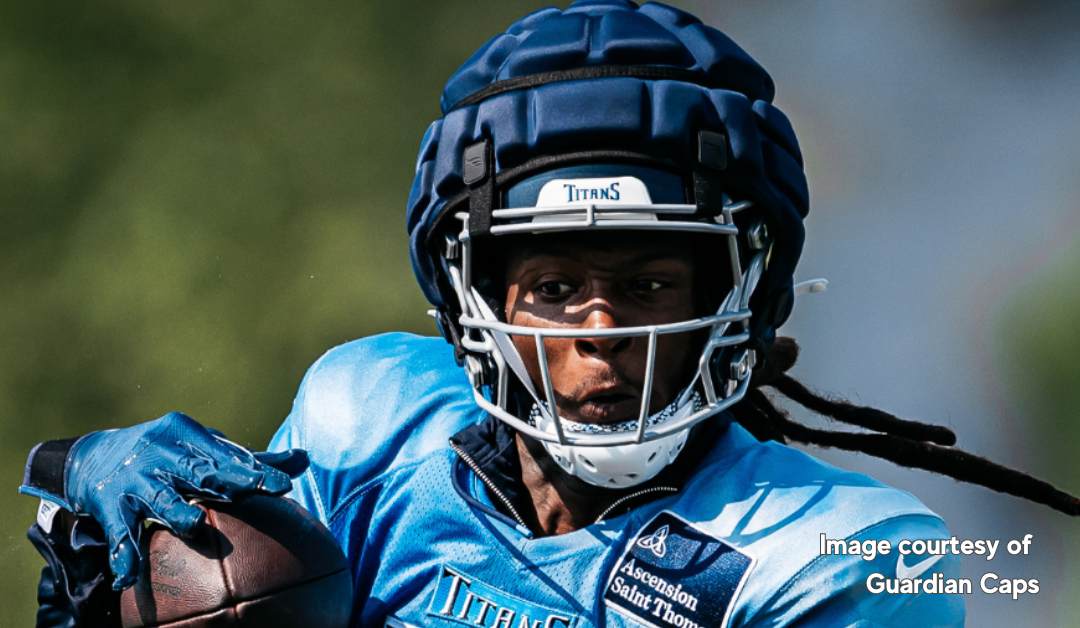This fall, Guardian Caps are appearing more frequently in football, including on professional fields. As someone with experience with rugby and wakeboarding, I immediately noticed how these caps resembled scrum caps used in rugby or impact vests for wakeboarding.
Guardian Caps are soft-shell helmet covers designed to reduce the force of impacts during collisions. With concussions continuing to be a significant issue in contact sports, especially football and hockey, these caps offer a fresh approach to an old problem. Let’s face it, over the past few decades, helmet designs have not changed much while concussions have remained a persistent issue.
How Do Guardian Caps Work?
The principle behind Guardian Caps mirrors the evolution of modern vehicle safety. In the past, cars had rigid shells and heavy steel bumpers to protect passengers. Today’s vehicles are designed to crumple, absorb, and disperse impact during collisions. Guardian Caps follow a similar approach. They absorb and disperse the energy from impacts, aiming to reduce the damage players experience during collisions.
What the Research Shows
Independent studies, such as those from the Virginia Tech Helmet Lab, indicate that helmet shell add-ons can reduce linear and rotational acceleration. Both of these are associated with head injuries and concussions. However, their effectiveness depends on key factors:
- The helmet model is critical. A poorly performing helmet with an add-on may not protect as well as a high-performing helmet without one.
- These tests only covered a few helmet models, so results may not be universal. Youth football helmets, for example, were not included in the study.
It’s also essential to understand that any type of cap does not prevent all types of concussions. Some concussions are caused by rapid acceleration and deceleration (like “whiplash”), where the brain shifts within the skull when there is no actual head contact. The caps won’t protect against these forces. And although they absorb impacts, they don’t deflect force in the same way traditional hard helmets do.
The Guardian Sports website itself emphasizes that no helmet or helmet add-on can completely eliminate concussion risks. While they help reduce risk, no definitive conclusions can be made yet about their long-term impact.
The Pros and Cons
Even though I tend to be skeptical of claims that gear can significantly reduce concussions, I find Guardian Caps promising. We’ve already seen them used by teams in the NFL and, closer to home, by the Saskatchewan Roughriders. Whether they live up to the claims or not, what we learn from using them will help us in the future. Concussion prevention is key, and trying new approaches is necessary.
Pros of Guardian Caps:
- Impact Reduction: They reduce the force of collisions by up to 33%.
- Lightweight and Practical: At only 7 oz, they don’t add much weight to helmets.
- Multi-Sport Use: Guardian Caps are being tested in hockey and lacrosse as well.
Cons of Guardian Caps:
- Limited Protection Against Some Injuries: They don’t prevent concussions caused by rapid brain movement inside the skull when there is no head contact (whiplash mechanism).
- Helmet Model Dependent: Their effectiveness depends on the quality of the helmet they are used with.
- Not a Complete Solution: More research is needed, and Guardian Caps aren’t a comprehensive fix for concussions.
Final Thoughts
Guardian Caps represent an innovative step in reducing head injuries in sports like football by absorbing and displacing impact rather than just shielding against it.
Though they aren’t a magic bullet, Guardian Caps are part of the solution. Testing them, even if their results vary, will help us move forward in understanding how to reduce concussion risk. Whether Guardian Caps become a lasting part of the game or face challenges like other technologies, such as the Q-collar, remains to be seen. Still, it’s encouraging to see companies pushing the boundaries of concussion prevention.
In the end, every step taken toward better understanding head protection is worth it, and Guardian Caps may provide valuable insights along the way.
Now if you or someone you know has continued symptoms after a concussion it is vital that they seek medical advice. For those living in Saskatchewan they can feel free to book a Concussion Assessment at North 49 24/7 through our online scheduling platform.
Kregg

